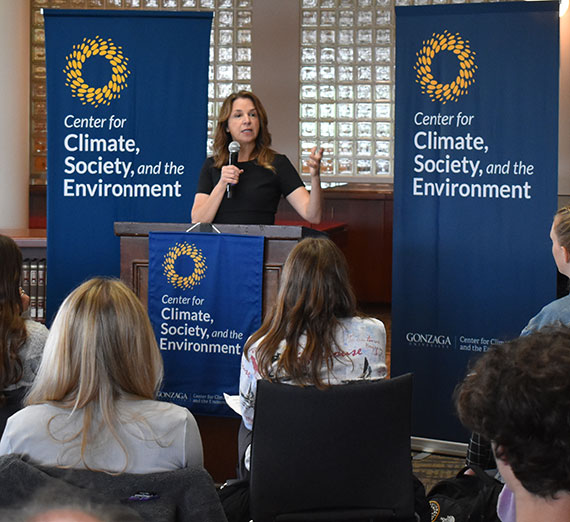Lands Commissioner Hilary Franz and Zags Discuss Climate Change

On October 11, Washington Commissioner of Public Lands Hilary Franz talked with Gonzaga students about the impacts of climate change on natural resources and public land.
Franz currently manages nearly 6 million acres of public land – including oceans, uplands, and recreation land. Franz prioritizes supporting urban and rural communities, while also emphasizing the importance of sustainable land use. In her talk with Gonzaga students, Franz touched on the effects climate change has had on Washington’s land and citizens.
Franz opened her speech by talking about the impacts of climate change in Washington. Specifically, Franz recounted how wildfires have become the new norm in the state. Large wildfires pose new risks for communities as fires are increasingly occurring near human-inhabited areas. She said she’s prioritized forest management and increasing the health of Washington State’s forests to help prevent deadly wildfires.
Franz has created a forest health plan that prioritizes forests at the highest risk of disease and damage. Through forest thinning, small and diseased trees are removed to enhance the health of forest ecosystems, and the removed trees can be used as building material.
Franz also mentioned other consequences of climate change in Washington such as high heat levels in urban areas and the loss of aqua forests in Puget Sound. She advocated for investing in renewable energy and pumping carbon into basalt rocks as potential climate change solutions.
Franz wrapped up her talk by answering questions posed by Gonzaga students. These questions were centered around climate change and the Department of Natural Resources’ role in helping combat climate change.
Students asked about finding a balance between recreational opportunities and ecological sustainability on public lands, steps the Department of Natural Resources is taking to mitigate climate change, and climate change’s impact on biodiversity in Washington. Franz addressed students’ questions by emphasizing the importance of working together to find solutions, educating people on responsible recreation, and caring for Washington’s public spaces.
Franz currently manages nearly 6 million acres of public land – including oceans, uplands, and recreation land. Franz prioritizes supporting urban and rural communities, while also emphasizing the importance of sustainable land use. In her talk with Gonzaga students, Franz touched on the effects climate change has had on Washington’s land and citizens.
Franz opened her speech by talking about the impacts of climate change in Washington. Specifically, Franz recounted how wildfires have become the new norm in the state. Large wildfires pose new risks for communities as fires are increasingly occurring near human-inhabited areas. She said she’s prioritized forest management and increasing the health of Washington State’s forests to help prevent deadly wildfires.
Franz has created a forest health plan that prioritizes forests at the highest risk of disease and damage. Through forest thinning, small and diseased trees are removed to enhance the health of forest ecosystems, and the removed trees can be used as building material.
Franz also mentioned other consequences of climate change in Washington such as high heat levels in urban areas and the loss of aqua forests in Puget Sound. She advocated for investing in renewable energy and pumping carbon into basalt rocks as potential climate change solutions.
Franz wrapped up her talk by answering questions posed by Gonzaga students. These questions were centered around climate change and the Department of Natural Resources’ role in helping combat climate change.
Students asked about finding a balance between recreational opportunities and ecological sustainability on public lands, steps the Department of Natural Resources is taking to mitigate climate change, and climate change’s impact on biodiversity in Washington. Franz addressed students’ questions by emphasizing the importance of working together to find solutions, educating people on responsible recreation, and caring for Washington’s public spaces.
Learn about future Climate Center events
